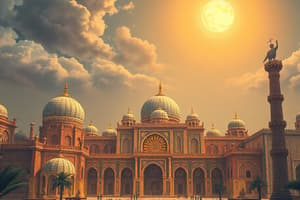Podcast
Questions and Answers
What are the five main climate zones?
What are the five main climate zones?
tropical, dry, temperate, cold, and arctic
How do cultural traditions help strengthen community cohesion?
How do cultural traditions help strengthen community cohesion?
Cultural traditions help preserve local identities and strengthen community cohesion through shared beliefs, values, customs, and activities.
Give an example of a cultural tradition related to food customs and cuisine.
Give an example of a cultural tradition related to food customs and cuisine.
Italian cuisine with its pasta dishes
How do art and architecture reflect a society's cultural norms and beliefs?
How do art and architecture reflect a society's cultural norms and beliefs?
What are some examples of pivotal historical discoveries and inventions?
What are some examples of pivotal historical discoveries and inventions?
Explain the concept of landforms in world geography.
Explain the concept of landforms in world geography.
What are biomes and how do they contribute to our understanding of the environment?
What are biomes and how do they contribute to our understanding of the environment?
Why is world geography important for understanding human populations?
Why is world geography important for understanding human populations?
How do landforms influence climate and vegetation on Earth?
How do landforms influence climate and vegetation on Earth?
Explain the significance of biomes in ecosystem balance.
Explain the significance of biomes in ecosystem balance.
Study Notes
General Knowledge
This article aims to provide you with essential information and facts on various aspects of general knowledge, including world geography, cultural traditions, and historical events. These three areas form the backbone of general knowledge, allowing us to broaden our understanding of the world around us.
World Geography
World geography is the study of Earth's physical and political features. It encompasses the location, characteristics, distribution, and interaction of human populations and their environments. Here are some key concepts from this field:
Landforms
Landforms are natural or artificial structures on the surface of the earth, such as mountains, valleys, plateaus, plains, hills, canyons, islands, peninsulas, capes, bays, gulfs, lakes, rivers, deserts, forests, grasslands, swamps, glaciers, and oceans. Understanding these landforms helps us appreciate the diversity of the planet and how they influence climate, vegetation, and population distribution.
Biomes
Biomes are large, naturally occurring communities of plants and animals adapted to specific environmental conditions. There are five major biomes: terrestrial, freshwater aquatic, marine aquatic, desert, and polar. Each biome has its unique set of plant and animal species that thrive under certain ecological niches, providing insights into evolutionary patterns and maintaining ecosystem balance.
Climate Zones
Climate zones represent regions of the Earth characterized by similarities in temperature patterns throughout the year. Five main climate zones include tropical, dry, temperate, cold, and arctic. Studying these zones indicates how human civilizations have adapted differently across distinct climates, leading to diverse social practices.
Cultural Traditions
Cultural traditions refer to shared beliefs, values, customs, behaviors, artifacts, institutions, and activities among individuals in society and passed down through generations. They help preserve local identities and strengthen community cohesion. Some examples of cultural traditions include:
Festivals and Celebrations
Festivals and celebrations are regular or annual events commemorating particular dates, religious or spiritual beliefs, or specific milestones in people's lives. Examples range from national independence day ceremonies, religious pilgrimages like Hajj for Muslims, carnivals, Mardi Gras, weddings, graduation parties, and retirement gatherings. These events showcase the uniqueness of each culture while fostering unity within the community.
Food Customs and Cuisine
Food customs and cuisine reflect a culture's history and heritage. Different cultures have their signature dishes and cooking techniques, shaped by factors like availability of ingredients, local crops, and traditional recipes inherited from previous generations. For example, Italian cuisine boasts pasta dishes, Japanese food focuses on rice-based meals, British gastronomy includes hearty meat pies, and Indian culinary art revolves around spices and curries.
Art and Architecture
Artistic expression and architectural styles often mirror a society's cultural norms, beliefs, and aesthetic sensibilities. From cave paintings and ancient sculptures to modern street art and contemporary installations, art forms evolve continuously. Similarly, architecture reflects local construction methods, materials, and artistic preferences, creating iconic structures such as Angkor Wat in Cambodia or the Sagrada Família in Spain.
Historical Events
Historical events shape societies and change the course of human civilization. While it is impossible to cover all significant historical occurrences here, some notable ones include:
Discoveries and Inventions
Pivotal discoveries and inventions have revolutionized human life, ranging from early technological advancements like fire and the wheel, to more recent innovations like electricity, the internet, and medical breakthroughs. These developments continue to impact our daily routines and societal progress.
Wars and Conflicts
War and conflict have been integral parts of human history, shaping global politics and international relations. Major wars like World War II or the Cold War transformed world powers, while smaller conflicts often led to lasting peace treaties or destabilization of entire regions. Understanding these events provides insight into the complexities of diplomacy and military strategy.
In conclusion, studying general knowledge in relation to world geography, cultural traditions, and historical events allows us to gain a deeper appreciation for humanity's collective achievements and challenges. By exploring these topics, we can enhance our ability to navigate our increasingly interconnected and dynamic world.
Studying That Suits You
Use AI to generate personalized quizzes and flashcards to suit your learning preferences.
Description
Explore essential information on world geography, cultural traditions, and historical events to broaden your understanding of the world. Learn about landforms, biomes, climate zones, festivals, food customs, art, discoveries, wars, and more.




